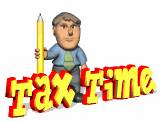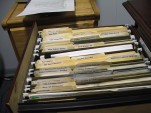As a kid, April 15 was a holiday in our house. It was the day my accountant mother could breathe again after over 3 long months of helping her clients. I may have learned a thing or two along the way, so I’m happy to share some tips on how to get organized before heading to your accountant’s office, or, if you’re one of those brave souls who tackles the task on your own, before you sit down at the kitchen table amid a sea of paperwork. In either case, the key is starting early… as in January 1 early.

Taxes can get pretty complicated depending on what kind of return you have to file. Do you have a business? Dependents? Itemized deductions? There are already a lot of great sources of information out there about which documents and information you need to gather. Instead, let’s focus on how to move through this year proactively so that when April 2020 rolls around, you won’t be scrambling to find all this documentation.
The first thing you should do is have a dedicated folder where you can file any paperwork that you may need come next April.
Know which documents you need to keep in each folder and make lists. If you need help with this, your tax preparer should be able to help you create a customized list based on how you file and the specifics of your financial architecture. Otherwise, here’s a great general resource: https://www.rgbrenner.com/resources/what-do-i-bring-to-my-tax-appointment/
Attach these lists to the front of each folder. Cross off items as they go into the folder.
Documents come in all year, so this is a great way to keep yourself informed at a glance. A few notes:
Now that you’re filing, try to stay ahead of the record-keeping by doing it monthly. This effort will help both you and your accountant simplify the process come March or April, so you don’t have to scramble to collect all the information and dollar amounts in a last-minute rush.
Pick your poison to start an electronic or written file for keeping records of expenses. I’m a lover of Excel, but some folks prefer Word or even handwritten lists. If you’re in the latter camp, I recommend buying a dedicated ledger book to record line items. Keep separate files for personal and business. Once a month, go through your saved receipts and enter them into your record. Remember to categorize the type of expense for each receipt.
————
As you can see, it’s all about establishing a system that you can easily maintain throughout the year with minimal effort. It’s so easy to get behind with all the personal and professional obligations we balance. If we can stay aligned with the system and find an hour a month to maintain it, then when that April 15 holiday inevitably rolls around again, we can face it head-on with confidence and careful preparation.
¹ https://www.rgbrenner.com/resources/what-do-i-bring-to-my-tax-appointment/
My Evernote conversion occurred about five years ago. Stuffed in the back of my junk drawer (yes, I also have one) for several years, lay a handwritten recipe for the best maple balsamic salad dressing obtained from a restaurant in Vermont. Frustrated with my lack of organization for something so valuable, I downloaded Evernote and my life was forever changed.
I created a notebook in the Evernote app and titled it “Recipes,” took a photo of the recipe within the Evernote app et voila! Wherever I am, on my phone, tablet or laptop I have a screenshot of the recipe. I quickly saw how transformational this would be in both my personal and professional life. When a friend recommends a great restaurant, it goes into the notebook I created titled “Recommended Restaurants”. I also do this for movies, books, wine, travel destinations, decorating ideas. All those great details we scribble on the back of napkins never to find again.
If I’m surfing the web, I can use Evernote webclipper to clip an article or page and put it into the notebook of my choice. I can also dictate notes into Evernote and draw using the Skitch app.
I also have a notebook for each of my kids. I have a screenshot of their health insurance cards, health records, photos of their artwork from Kindergarten so I could get rid of those large poster-size monstrosities, er, I mean works of art. The list goes on.
For my business, I’m able to share notebooks with my team and with our clients. We often take notes during an organizing session and share these with our clients. Evernote also eliminates the need to email documents back and forth. Instead, the whole team can collaborate and has access whether they are working remotely or in the office to notes, documents, photos, etc.
I’m barely scratching the surface of Evernote’s endless possibilities. For more information and to create your free online account check out www.evernote.com

One of the most confusing parts of getting ready for tax time is knowing what documents you need to prepare your taxes. Basically, the documents break down into three categories: Income statements, deductions, and receipts.
The Challenge of Receipts
Receipts are the most challenging documents to store and organize. This is especially true if you are a small business owner. Receipts are your main protection if the IRS decides to audit and details are critical. It’s imperative to keep all receipts pertaining to business and a very good idea to get into the habit of making notes on entertainment and dining expense receipts.
Consider Scanning for Added Protection
Scanning your receipts can help solve two problems. First, if the IRS comes knocking, they won’t care that your receipts from four years ago have faded; so scanning receipts is a great way to give you that added layer of protection. Secondly, if you set up a system to scan as you go, then you won’t have to wonder where all your receipts are stored, and you won’t have to deal with that shoebox full of papers come tax time. There are many smartphone apps dedicated to receipt scanning that are easy to use and can save you hours of searching, sorting, and organizing papers during tax time.
Income Statements:
W-2 – wages and salary
W-2G – gambling winnings
Form 1099-R – retirement income
Form 1099-INT – interest
Form 1099-DIV – dividends
Form 1099-MISC – miscellaneous income, including self-employment
Form 1099-G – government payments
Form 1099-SA – MSA or HSA distributions
Form 1099-B – broker or barter exchanges
Form SSA-1099 – Social Security benefits
Form RRB-1099 – railroad retirement
Schedule K-1 – partnership income or loss
Deductions:
Form 1098 – mortgage interest
Form 1098-T – tuition
Form 1098-E – student loan interest
Receipts & Records:
Unreimbursed mileage related to work or volunteering
Charitable donations
Contributions to retirement plans
Healthcare expenses
Self-employment income and expenses, including any:
-Home-office expenses
-Health-insurance premiums paid
-Transportation costs
-Advertising fees
Rental property
Moving expenses, if you moved for a new job
Expenses for energy-efficient home improvements
Tuition or fees paid for education for you, spouse, or dependents
Retirement account rollovers
Child care and dependent care expenses, including the employer identification number (EIN) or SSN of the care provider
Additional Documents:
Your Social Security number (SSN) or taxpayer identification number (ITIN) and SSN’s or ITIN’s for spouse and dependents (if any)
Your birth date and birth date for spouse and dependents (if any)
A copy of last year’s return
Documents List Source: H&R Block
I look at the last week of the year as a super productive week since I am not scheduled to work, and I can spend time getting myself ready for the new year. I want to be as organized as possible before January 5, 2015, which is my first day back to work! Below is a list of suggestions that may help you start your new year off a bit more organized.
Donations 
-If you want to maximize your donations for the 2014 tax year, take one more look through your closets, bookshelves, cabinets, attics, basements and garages to pull anything out that needs to be donated. Children’s toys and books are usually a gold mine for most donation establishments.
-After the holidays, as you integrate your new gifts, take stock of your duplicates, triplicates or otherwise unwanted things that can be better utilized by others.
-Keep in mind that you shouldn’t wait until December 31 to drop off your donations, because if the center hits their capacity level, they may stop accepting donations.
-Some donation centers will pick up your unwanted goods as long as you are on their schedule. Some donation center choices are GreenDrop, Vietnam Veterans of America, The Salvation Army, and Impact Thrift Stores.
-Make your final online cash donations as soon as possible since you don’t want to get stuck with slow or crashing websites at the last minute.
Files 
-Assuming that you have them, the end of the year is a great time to purge your old files and create new ones. If you need help creating a filing system, a professional organizer can help. You can go to the ‘Find an Organizer’ tab at the top of this page.
-Go through your 2014 bills, pull them out of their files, and clip or band them together if you are going to need them for your taxes. If you don’t need them for your taxes, I would suggest shredding anything that has personal information or account numbers. Most of my clients shred their department store bills and hold onto some of their utility bills for another year (I think they just want the security of having them…just in case).
– A filing cabinet or file box are both great choices to keep your files organized and accessible.
-If you scan your bills and receipts, remember to create new files on your computer.
Hopefully, there is something here that will help you start 2015 off with a little more organization in your world.
 If you are reading this, chances are that you will need an executor and/or will be an executor at some point in your life. An executor is the person named in a will to administrate the estate of the person who died leaving that will. The job of the executor is to make sure that the deceased person’s wishes, as described in the will, are carried out.
If you are reading this, chances are that you will need an executor and/or will be an executor at some point in your life. An executor is the person named in a will to administrate the estate of the person who died leaving that will. The job of the executor is to make sure that the deceased person’s wishes, as described in the will, are carried out.
Here are some of the tasks executors perform:
These tasks can be complex, full of “red tape” and frustrating, so it is important to choose the right person for the job.
A good executor is:
Too often, people making a will choose their executor based on family dynamics or out of a wish to bestow an ‘honor’ on a special person in their life. They give little consideration to the personal traits and skills needed by the executor, with disastrous results. As a professional organizer specializing in finances and paperwork, I have witnessed these horror stories when the wrong person was chosen for the job of executor:
The key take-away from this post is to choose your executor carefully, based on the skills needed to do the job. But perhaps, you have already chosen an executor who lacks some of these skills, and you don’t want to make waves by changing. Or maybe, you have been named as someone’s executor and feel unqualified for the job. In either case, don’t despair, because help is available. Professional organizers can help inventory the deceased person’s possessions, and can help sell and/or donate possessions not inherited by a specific individual. Some organizers specialize in the organizing of finances, paperwork and information, and can help with these aspects of the executor’s job. A good place to find an organizer to help with the administration of an estate is the ‘Find an Organizer’ link at www.napo-gpc.org.
What reaction comes up in you when you hear that phrase? “I’ll think about that someday–in the distant future.” “I’m too young to bother with that stuff.” “That’s for people with problems I don’t have yet—thank God.” “I wouldn’t know where to begin.” “I don’t have any affairs to get in order!”
Do you have children under your care? Are you responsible for an aging relative, in whole or in part? Is there someone with disabilities in your life? Do you feel uneasy when you hear of a catastrophic event happening to someone younger than you? Do you treasure your independence? Do you own a home and/or things that are special to you? Do you do everything legally within your power to minimize your annual income taxes?
If you answered “yes” to even one of these questions, then starting now to get your affairs in order might make sense for you.
We usually associate getting our affairs in order with legal documents and professional experts such as wills, powers of attorney and advance directives, lawyers, accountants and financial planners. While these documents and experts certainly play important roles in your well-ordered affairs, just making a few basic lists yourself can be a useful start:
Still feeling daunted? You might consider enlisting the help of a professional organizer to get your affairs in order. Professional organizers are experts at helping people sort through quantities of papers and objects, separate the important from the inessential, and arrange useful objects and information in systems that are easily accessed and used. Getting your affairs in order is just a process for capturing the essential information about you as a person and what you own, in a form that can be used readily by others if you become unable to communicate, along with legal documents that clearly express how you want yourself and your possessions to be handled. You can do this, and an organizer just might provide you the support you need to get started!